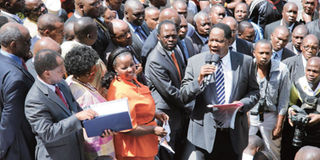Laws put order to party pacts

PHOTO | JENNIFER MUIRURI ODM’s Dalmas Otieno speaks during the signing of a coalition agreement between ODM, Wiper and Ford Kenya at the KICC.
What you need to know:
- Mr Kenyatta and Mr Ruto might be like two peas in a pod by virtue of a common history in the fast-fading “Independence Party”, Kanu, a common mentor in retired President Daniel arap Moi and a shared appointment with the dock at the ICC
- By contrast, Mr Odinga and Mr Musyoka are like oil and water. The former has been the quintessential rough-hewn rebel, the latter, the smoothie establishment figure
- Having, like the VP, been treated with ill-disguised disdain by the Uhuru-Ruto team, it came as a surprise when Mr Mudavadi spent the latter half of Tuesday afternoon striking a deal with the pair
The pace at which alliances have been cobbled together over the past few days has the direct effect of imposing some sort of order and sanity ahead of the March 4 General Election.
From a bewildering array of declared presidential candidates from a multitude of politicians, the pre-election pacts sealed since Sunday reduce vastly the number of aspirants and make it clearer that there will only be a handful of serious protagonists still standing come the polls.
Some of the alliances have been long-signalled, while others seemed to have been put together at breakneck speed to meet the deadline of lodging election pacts with the Registrar of Political Parties. (Read: Last-ditch efforts to seal coalition deals)
Deputy Prime Minister Uhuru Kenyatta of TNA coming together with Eldoret North MP William Ruto was no surprise. The two post-election violence suspects had indicated well in advance that they would run together, and that what remained was the formal announcement delivered on Sunday at a rally in Nakuru. (Read: Uhuru and Ruto first to sign pact)
More surprising was what now appears to be the main rival to the team that has adopted the UhuRuto tag line popularised by social media; Prime Minister Raila Odinga and Vice President Kalonzo Musyoka coming together under the new Coalition for Reform of Democracy (Cord) banner. (Read: Raila, Kalonzo seal pre-election coalition )
Mr Kenyatta and Mr Ruto might be like two peas in a pod by virtue of a common history in the fast-fading “Independence Party”, Kanu, a common mentor in retired President Daniel arap Moi and a shared appointment with the dock at the ICC.
By contrast, Mr Odinga and Mr Musyoka are like oil and water. The former has been the quintessential rough-hewn rebel, the latter, the smoothie establishment figure.
Politics has always made accommodation for strange bedfellows, but in the case of Mr Odinga and Mr Musyoka, there seemed to be a deep-seated personal hostility that kept them apart, not to mention their contrasting backgrounds and style.
When Mr Odinga differed bitterly with Mr Kenyatta and Mr Ruto, there seemed to remain a mutual, if grudging, respect.
In the case of Mr Odinga and Mr Musyoka, the antipathy seemed to be deeply-rooted, mutual hostility that went beyond mere political differences.
These are differences that pre-dated the sometimes comical duels for space in the early years of the grand coalition government; or the bitterness brought out during the 2010 referendum campaigns when Mr Odinga mercilessly skewered the so-called “watermelons” accused of being half-hearted in the Yes camp.
How two such contrasting figures reached such swift accommodation and how they will work together in the campaigns and after, if they form the next government, remains to be seen.
However it seems likely that they were prodded to sign their deal by conclusion of the Ruto-Uhuru pact that seemed to have stolen the thunder from everybody else.
The initiative was partly regained when Mr Odinga and Musyoka pulled a large crowd on the grounds of the Kenyatta International Conference on Tuesday to form an improbable union that also includes Trade Minister Moses Wetang’ula of Ford Kenya.
The emergence of two strong alliances, a reminder of Mr Odinga’s prediction of a two-horse race, seemed to have spurred other declared candidates to conclude their own pacts. Most notable, was Deputy Prime Minister Musalia Mudavadi, previously, touted as the most likely partner for Mr Musyoka.
Having, like the VP, been treated with ill-disguised disdain by the Uhuru-Ruto team, it came as a surprise when Mr Mudavadi spent the latter half of Tuesday afternoon striking a deal with the pair. (Read: Uhuru, Ruto, Mudavadi in new coalition pact)




